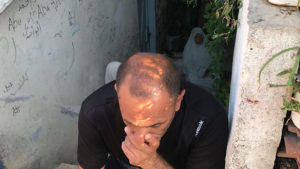
For the first time in 8 years, an Arab family was ordered removed from a Sheikh Jarrah home after long legal dispute.
– ‘The Jewish owners allowed the Arab tenants to live in the apartment for five years rent-free, but the Arab tenants caused financial damages to the owners, so a court ordered eviction was inevitable,’ says Arieh King, director of the Israel Land Fund.
By Yael Friedson
Law enforcement authorities evicted an Arab family from its home in east Jerusalem early Tuesday after the property was purchased by Jews.
This is the first eviction of an Arab family from its home in the Sheikh Jarrah neighborhood since 2009.

Repairing the damaged property after the Arab family’s eviction – Photo: Israel Land Fund
Police forces deployed in the neighborhood on Tuesday morning to secure the execution office personnel as they evicted the family. Entrances to the neighborhood were closed to both vehicles and pedestrians.
The eviction is the result of a long legal dispute. Under Israeli law, if Jews can prove their families lived in east Jerusalem homes before the 1948 War of Independence, they can demand that Israel’s general custodian office release the property and return their ownership rights.
During the Jordanian rule of Jerusalem, from 1948 to 1967, the property was rented to a Palestinian family.
In 2013, the Supreme Court ruled in favor of the Jewish claimants, who subsequently sold the property on to another Jewish buyer, who acquired with the help of right-wing organization Israel Land Fund.
Since then, the Palestinian family has been waging a legal battle against the eviction.
The Shamasna family claimed it has been living in the building since 1964, arguing it enjoys the status of a tenant that cannot be evicted. The court, meanwhile, only recognized it has been living there since 1972.
Two years ago, the Supreme Court ordered to evict the family from the house, but allowed for a year and a half extension to allow the family time to make the necessary preparations.
The evacuation was then postponed time and again, until on Monday the Execution Office determined the evacuation will be done on Tuesday.
Fahamiya Shamasna, 75, told AFP that police arrived before dawn ordering her, her sick husband Ayoub, 84, their son and his family out of the house in the upscale Sheikh Jarrah neighborhood where the couple lived for 53 years.
“What greater injustice is there than this?” she said. “Maybe we will sleep in the street.”
Plans for the eviction had been criticized by the European Union, United Nations and various Western governments, though not the United States.
The United Nations agency for Palestinian refugees, UNRWA, said it would seek to support the family financially to find another home.
Scott Anderson, head of UNRWA’s West Bank operations, said such expulsions made peace between Israelis and Palestinians harder to achieve.
“We all support the two-state solution and a negotiated peace process. The expansion of settlements is not helpful to that end,” he told AFP.
Arieh King, a member of the Jerusalem city council and the director of the Israel Land Fund, said, “70 years after the Hubera family was banished from its home, and after the owners allowed the Arab tenants to live on the property for five years without any rent, and since the tenants caused financial damages to the owners, the eviction was inevitable.

The property – Ynet
“I foresee additional evictions in the coming year of tenants who refuse to recognize Jews as the owners of the properties they live in. Along with the opening of a National Insurance Institute office nearby, the Nahalat Shimon neighborhood is facing a wave of Jewish settlement, the kind of which Jerusalem residents have been waiting many years for.”
Left-wing NGO Ir Amim said following the eviction, “Today, another sad landmark case has been noted in Jerusalem. This settlement project would not have gone ahead without support from the state. It is immoral, useless and will cost us all dearly.”
Left-wing NGO Peace Now says the house is part of a larger process of establishing settlements in Sheikh Jarrah.
“Settlers are already inside the Shamasna family’s home,” it said in a statement Tuesday morning.
“The eviction of the Shamasna family, who resided in the house since 1964, is not only brutal but it is also indicating a dangerous trend that could threaten a future compromise in Jerusalem,” it said.
AFP contributed to this report.
View original Ynet publication at:
https://www.ynetnews.com/articles/0,7340,L-5012292,00.html






 Israeli New Shekel Exchange Rate
Israeli New Shekel Exchange Rate